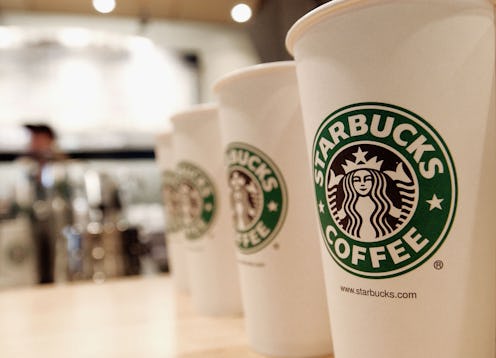News
Starbucks Just Made A Huge Policy Change In Response To The Arrest Of 2 Black Men

On Thursday, Starbucks Executive Chairman Howard Schultz made a major announcement about a company policy that's been very visible in the news in recent weeks. Specifically, Starbucks is changing its bathroom policy, allowing non-customers to use them, too, in the aftermath of the infamous viral video of black men being arrested at a Philadelphia location last month.
The two men, Donte Robinson and Rashon Nelson, were denied the key to the bathroom because they hadn't yet purchased anything, even though they were waiting to meet a friend. A manager at the Starbucks subsequently called the police on them, and they were arrested and removed from the premises.
Bystander video of the arrest exploded on social media, and led many observers and critics to accuse the ubiquitous coffee chain of racism. Now, in an apparent effort to prevent anything like this from happening again, Schultz has announced that anyone who asks a Starbucks employee for a bathroom key will get it, regardless of whether or not they've purchased anything.
"We don't want to become a public bathroom, but we're going to make the right decision 100 percent of the time and give people the key," Schultz said on Thursday, as detailed by NPR. "Because we don't want anyone at Starbucks to feel as if we are not giving access to you to the bathroom because you are 'less than.' We want you to be 'more than.'"
Starbucks employees nationwide will also reportedly be undergoing anti-racial bias training on May 29. Starbucks tells Bustle that the new bathroom policy that's been shared with employees is as follows:
Policies are still under the 90-day review, but ensure all customers coming in feel welcome. If someone needs to use the restroom, please let them, but if the safety of that customer, other customers or partners is in jeopardy, use your 911 quick reference guide for guidance on any action to be taken.
Starbucks has been inundated with media coverage since the video of the April 12 arrests went viral, much of it pointedly negative and challenging. Mere days after the story broke, a spokesperson told The New York Times that the employee who called the police on the two men no longer worked for the company.
Starbucks' chief executive, Kevin R. Johnson, characterized the incident as "reprehensible," and further told ABC's Good Morning America that it was ultimately his responsibility.
"I'll say the circumstances surrounding the incident and the outcome at our store on Thursday were reprehensible," Johnson told the program. "They were wrong, and for that, I personally apologize to the gentlemen that visited our store."
He also specifically noted that the company would consider policy changes in the aftermath of the incident, and Thursday's news of the new bathroom policy would appear to be an example of that.
It remains to be seen whether Starbucks will take any further steps in response to the arrests. Robinson and Nelson, for their parts, reportedly reached a financial settlement with the company, although the amount is not publicly known ― to the contrary, according to The New York Times, Starbucks specifically considers the amount of the settlement "confidential."
They also reportedly struck a deal with the city of Philadelphia to avoid any litigation, with the city agreeing to spend $200,000 to assist young entrepreneurs. The pair's only financial settlement from the city is purely symbolic ― each of them received $1, with the far greater sum being redirected toward the entrepreneurial program.
Starbucks is one of the biggest and most profitable coffee chains in the entire world, boasting more than 26,000 locations worldwide. Of those, more than 8,000 locations operate within the United States, and all of them will reportedly be closing on May 29 to facilitate the anti-racial bias training that Starbucks has also promised in the aftermath of the arrests. In all, according to The Guardian, the training will affect some 175,000 employees.